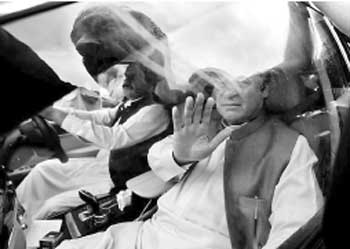Tuesday Feb 24, 2026
Tuesday Feb 24, 2026
Saturday, 16 September 2017 00:50 - - {{hitsCtrl.values.hits}}
 ISLAMABAD (Reuters): Pakistan’s Supreme Court on Friday rejected petitions seeking a review of its July 28 ruling that disqualified Prime Minister Nawaz Sharif from office, upholding a verdict likely to influence the next general election, due in mid-2018.
ISLAMABAD (Reuters): Pakistan’s Supreme Court on Friday rejected petitions seeking a review of its July 28 ruling that disqualified Prime Minister Nawaz Sharif from office, upholding a verdict likely to influence the next general election, due in mid-2018.
After an investigation into the Sharif family’s wealth, the Supreme Court employed a little-used constitutional provision to rule Sharif unfit to hold office because he did not declare a small source of income, which he has disputed receiving.
The country’s top court also disqualified three of Sharif’s children, including heir-apparent Maryam and her husband, besides ordering a criminal investigation into the Sharifs and Finance Minister Ishaq Dar, who has stayed in his post.
On Friday, a five-judge bench dismissed the petitions filed by the Sharifs and Dar, without specifying reasons.
“All the review petitions stand dismissed,” said Asif Saeed Khosa, who headed the bench, which is expected to provide the reasons for its decision next week.
It remains unclear, however, whether the Sharifs will be disqualified for a fixed time, perhaps several years, or be barred from office forever.
That could have major implications for Nawaz and his daughter Maryam. She is being touted as a future leader of the ruling Pakistan Muslim League-Nawaz party, and is likely to run for parliament in the 2018 polls.
Sharif’s disqualification stems from the Panama Papers leaks in 2016 which appeared to show that his daughter and two sons owned offshore holding companies registered in the British Virgin Islands and used them to buy properties in London. In April, the Supreme Court ruled there was insufficient evidence to remove Sharif from office – by a split 2-3 verdict – over the Panama revelations but it ordered further investigations into his family’s wealth.
The judges in July said Sharif did not declare a monthly salary, equivalent to $2,722, from a company owned by his son when the veteran leader, who had held power twice in the 1990s, become prime minister for the third time.
Sharif has kept a grip on the ruling PML-N party, which has a solid majority in parliament, and elected one of his loyalists, Shahid Khaqan Abbasi, as his replacement within days of the court decision.